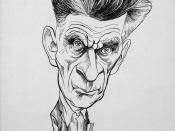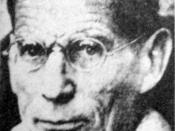"Endgame" is a work of severe irregularity that denies the audience of a any real plot and exhibits no progression or unification. The abstractness of the play leaves many possible interpretations but it is perhaps the uncomfortable structure by unusual use of language that is the most candid statement. The overall use of language for cyclic structure, repetition, and incoherent dialogue contains the central theme of the ineffectiveness of communication in society. Beckett experiments with technique to communicate in unexpected ways.
"Endgame" is set in an incomprehensible world after an alleged disintegration of society. The pair of complementary characters, Hamm and Clov, are therefore isolated, left with only one another as a last hope of communication, whether or not they are interested in it. The theme concerning language as a limitation to communication is developed partly through the motif of the cyclic conversation. There are the phrases like "If I don't kill the rat he'll die" in addition to the banter between characters where words are just repeated back and forth almost forming a skewed two voice poem.
This occurs for example in the discussion over the functionality of an alarm that begins "Hamm: The alarm, is it working?" and after six uses of the word "work", ends with "Hamm: Then because it's worked too little!" (2409). It seems to be an emphasis on form. The sound and pace of phrases take on meaning when the actual statements are nonsense. A similar effect is achieved through the motif of silences or pauses during the course of the play that seem to have meaning in the absence of sound.
This Modernist work is metafictional so the action on stage is broken up by habitually calling attention to itself as a work of art. This motif keeps the audience from escaping into...


